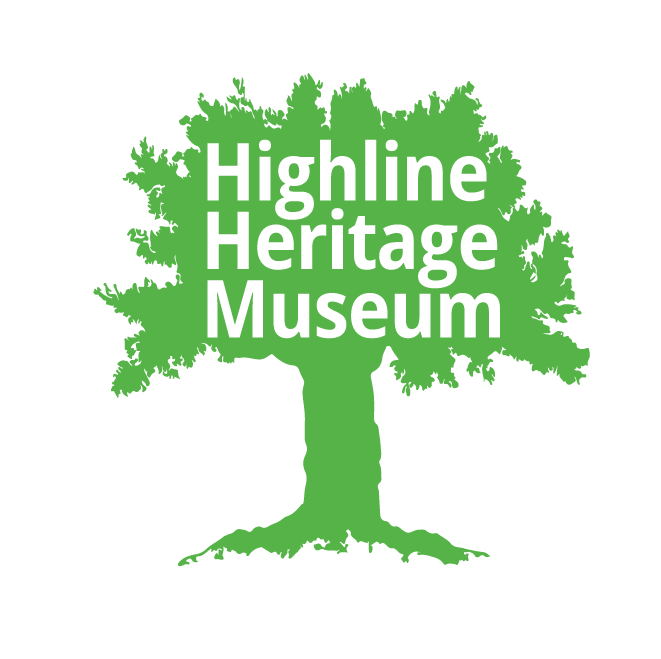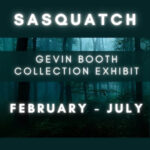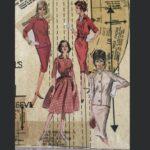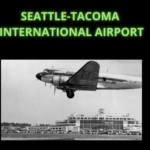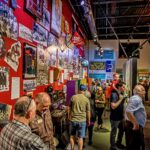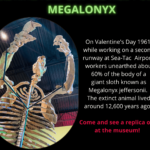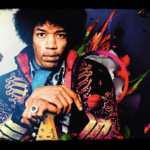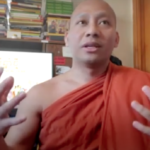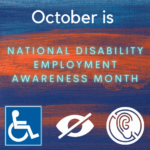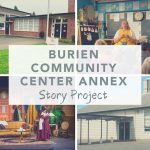Interview with Carol Selander
2011 July 26
In her home:
2621 SW 164th Pl. in Burien
Interviewer Barbara McMichael
BM: Carol, tell me when and where you were born.
CS: I was born in Coburg, Montana, October 12th 1920. My parents had homesteaded out on the plains of northeastern Montana. I believe I lived there about 6 weeks. They had decided not to do that I believe. I was the third of three little girls.
BM: Where did your family go after they left Coburg?
CS: To Spokane, Washington.
BM: Tell me the names of your parents.
CS: Ernest Polworth and Winnifield Olmsted Polworth.
BM: What did they do in Spokane?
CS: My dad was always in the lumber business. He had his own lumber yard in Spokane, Independent Lumber Company. He was a rabid Republican and I became a good Democrat. We still argued in our old age.
BM: Did you spend your girlhood there?
CS: Yes.
BM: Now you also ended up having a brother, is that right? So tell me the names of your sisters and brothers.
CS: Interesting names – Trula, who married Harold Whelan; Ernestine Quine who married Arthur Quine; and my brother Robert Polworth.
BM: Tell me a little bit about your childhood.
CS: I had a wonderful childhood. My folks always had a place for us to go at one lake or another. The one I remember most and loved the most was Coeur d’Alene Lake which is a beautiful, huge lake. Lived in Spokane Valley for a while which was wonderful. Still have friends at my old age. We knew each other in Spokane Valley as high school people.
BM: What did you do in high school, what kind of activities did you do outside of school? Did you work?
CS: Well, later. In college especially. But in high school, no.
BM: What did you do for entertainment?
CS: Sang. We had a wonderful Pep Club. We finally decided we should have something to wear so we all looked alike. Smocks had just come on the market. So we bought these cute little smocks to wear. We all lined up to show my mother and she doubled over laughing. We said “Well what’s so funny?” And she said “You all look like you’re pregnant.” But we sang at all the games and activities and such.
BM: Tell me a little bit about your repertoire. What were you singing? What kinds of songs?
CS: Current, popular songs. It was a lot of fun.
BM: Once you completed high school what did you end up doing? Did you stay in Spokane?
CS: Well I really wanted to go to Northwestern in Chicago and be a dietitian. I must have had a wonderful dietitian teacher to want to do this. Of course, this was during the depression, in the 30’s and into the 40’s.
So I ended up at the University of Washington. Oh, I went to Cheney one year. My older sister Trula moved to Seattle so I came to live with them and take care of the new baby who is now a successful attorney in Seattle. I babysat while she taught, always taught piano, became quite a famous piano teacher and was asked to come to China to do master classes, for instance.
But it was fun to be at the U in the music department. I got a job at the University Book Store and I worked there about 7 years. So I got through college, finally. I think it took about 7 years to get through college.
BM: It sounds like you and your sister, older sister, were very musically inclined. Where did you get that training? Was it through school, your parents?
CS: Through school, mine mostly. My sister graduated from the University of Washington, Trula, when Madame Jacobson was there, who was quite a fine French lady, piano teacher. Trula went on to teach all her life. My sister Ernestine was a wonderful singer. So she did that too.
BM: Tell me a little bit about combining school and work. How did that go?
CS: Well you just did it. I lived at the co-op. We had five co-ops at the university at that time. Houses – 3 men’s houses and 2 women’s. Many of us. We all had jobs. It was a wonderful place to live. We all did the work. They had a central kitchen that delivered the food to all the houses. All the rest of the work, the yard work, the housework, people who lived there did that to live there for $20 a month. It was just remarkable.
BM: Was this north of the campus?
CS: Yes, on 15th, our house was.
BM: Once you completed school had you met your future husband yet?
CS: No, I hadn’t. I was living still in the old Wilsonian. Interesting the League of Women Voters now has their state office in that building.
BM: And you’re a member of the League now.
CS: Yes, which tickles me.
You know when you’re young and have roommates, they change all the time. I finally had a roommate who turned out to be my husband’s sister. So I got to know her well. She wrote to him in the South Pacific, he was in the Navy during the war, and told him that she had met the girl that he was to marry.
So I’m sick as a dog with the flu in the Murphy bed in the dining room and this young officer in the Navy walks in and stared at me. That was my husband.
BM: That was Ken Selander.
CS: So we had two dates and got married.
BM: Two dates? WOW, they must have been pretty spectacular dates!
CS: Isn’t that terrible? We dashed to Bellingham to meet his family and we dashed to Spokane, on the train of course, that was the only transportation then, to meet my family. I remember my dad telling Kenny, “She’ll make you a good wife, Kenny. She works like a horse.”
BM: Were those your two dates? To go off and meet your parents?
CS: Yes.
BM: So you really believed that his sister knew what she was talking about.
CS: Yes. And I loved her. Ingrid her name was. So that’s how we met and got married. Went right back east on the train, sat up all the way. The trains were full of soldiers, they got all the perks of course. Kenny had started law school in DC at George Washington, before the war. Before he was out of the Navy he was back at night school finishing his degree. So we were there two years.
BM: What did you do while you were there?
CS: I worked for the American Red Cross. Loved the American Red Cross. We were processing all of the personnel who came back from overseas. That was pretty interesting to meet all these different people who had been all over the world.
BM: The stories they must have had to tell.
CS: Yeah, it was a good job. I was just a secretary I guess.
BM: What else did you do when you were in Washington, DC? Did you have a chance to get out and explore the surrounds?
CS: Oh yes. And I wanted to sing, of course. I’d been singing all my life. So I applied at what they called the Church of the Presidents, a little Episcopal Church, kitty corner across Pennsylvania from the White House, which faced Lafayette Square. So I got a job there singing and I got paid. That was pretty nice. And I worked at the Red Cross.
BM: Do you remember who came in when you were singing? Did any presidents show up?
CS: Oh yes, lots. Truman was there then. I think just Truman. It was interesting.
I might say, it was thrilling to be in Washington DC when World War II ended. Oh, the parades. Every service was represented, the Air Force, and the Navy, the Army and it was just spectacular. I think the parades went on for two days. They let everybody off work. Whatever the Federal Government did in letting people off work, the Red Cross followed suit, which was pretty nice.
BM: And speeches? Were there any grand speeches that you heard?
CS: Oh yes. At the Lincoln Memorial and the Washington Memorial. It was a great experience to live in DC at that time.
BM: When your husband graduated did you come right back to the Seattle area?
CS: Yes. We drove across the country. He and a buddy from Bellingham where he grew up had started law school back there before the war. So Bill was back there too, his buddy. We drove. His wife was given a new car for her birthday, given by her parents which was very nice. So all four of us drove back together. That was a trip across the country.
BM: What did you see, on your trip?
CS: Oh everything we could.
BM: Which route did you take?
CS: The northern route.
BM: Were they working on Mt. Rushmore at that point?
CS: I don’t think we saw Rushmore. We were farther north. We didn’t stop at big monuments like that. We had a lot of fun.
BM: Now, that was before the days of the interstate. So you stayed in some little interesting motels and campgrounds.
CS: Oh yes.
BM: Can you remember any of those?
CS: All four of us slept in one little room, we couldn’t get anywhere else to sleep.
BM: Tell me a little bit about how you ate on the road. What were diners like? Do you remember that?
CS: I don’t really remember. We always seemed to find enough to eat.
BM: So you came up over Snoqualmie Pass, I’m guessing.
CS: Yes.
BM: What a change from one side of the state to the other.
CS: Having grown up in Spokane, of course, my family was there, so we stopped there.
BM: What did you do once you got back to the Seattle area?
CS: Looked for a place to live.
BM: Where did you find one?
CS: We first lived in an attic in Mt. Baker district. Then we found that we could rent a house overlooking Golden Gardens, over in Ballard. We decided that if we ever bought a house we were going to have a view.
Then he decided to start his law practice in Burien. A distant cousin, he developed Chelsea Park housing. And he said “Oh you must come to the south end, there are no lawyers there and it’s just starting to grow.” It was a good time to be in Burien. One block long.
BM: Where did you decide to settle in Burien?
CS: We found that we could stay in a house right above here, on the Gregory Heights bluff overlooking west, for nothing, for two years. The people were leaving and wanted someone to take care of their place. So we were very fortunate, because at the time we had no income.
BM: How long did it take for your husband to establish his practice and what kind of law did he practice?
CS: He ended up mostly doing business law.
BM: Where was his office?
CS: In Burien.
BM: Do you remember a cross street?
CS: In little Burien, that’s all there was. In the middle of the block there, the north side. We rented the space there. Then finally, I got pregnant and had to quit and he hired a beautiful girl named Mary Marsden. I’ll never forget her. She was gorgeous. And she sat in the window at a desk.
BM: Did that bring in business?
CS: Oh, you bet! [Laughter] Everyone wanted to meet Mary. Maybe not business, but a lot of people.
BM: This was the beginning of your family of children. You have five children. Tell me your children’s names.
CS: Well, our first child just lived 3 days, and that was very difficult because we had spent 5 years trying to have a baby, and then to lose the first one, a little boy. Then we had five children, Ernest, Ken Jr., Ann, Linda, and Randy.
BM: All of your kids were born in the ’50’s. Every year or two you would have another baby.
CS: That’s right.
BM: So most of the children were born in a hospital down in Seattle, is that right?
CS: Yes, Swedish.
BM: Then your final child, Randall, was born right out here.
CS: At Highline.
BM: Tell me a little bit about that hospital.
CS: Oh, it was brand new. Everything was spanking clean and really excited to have a hospital in our area. It was so much easier than going into town.
BM: Who was your doctor?
CS: Dr. McMillan, he was at Three Tree Point area.
BM: Was he the family doctor for all of you?
CS: No, he was my own obstetrician.
BM: Tell me a little bit about raising children in the ’50’s right here in Burien.
CS: Well, it was wonderful. Living on this hillside.
BM: We should get to the fact that you then bought this house. That was when? Do you remember about when?
CS: We moved in when Ernie had his first birthday and he was born in ’54.
BM: So probably about 1955.
CS: Yes.
BM: Describe this house and where it’s located.
CS: Well, it’s on the hillside halfway between Three Tree Point and Seahurst, above Maplewild. A whole new development of houses. There were very few houses on this little piece of land in this area, this hillside. I don’t remember the man’s name who built these three long narrow houses in a row, all of which have this wonderful view of the Olympics and the sound and the beautiful big fir trees down below. People come in and say “Oh you got gypped.” and I say “No, I didn’t. I love the trees as much as the water and the mountains.” It’s wonderful to live here.
BM: Now we’ll talk about those children of yours. Where they went to school.
CS: Ernie graduated from Highline, they all did. Lake Burien Grade School, which is gone now of course. Graduated from Stanford in engineering and is an architect in San Francisco and has his own firm and was doing wonderfully until this recession and business has fallen off a lot. His wife Kya is an artist and does beautiful work. So her business has fallen off too. It’s not a good time right now.
Ken Jr. is a lawyer, married a lawyer, Jeannie O’Brien, daughter of John O’Brien who is our Speaker of the House in our legislature. Big O’Brien family. Oh I just love that O’Brien family. Now that Kenny is gone, they include me in everything. In fact, last weekend, I was at another birthday party. The whole family was there. It’s fun.
BM: Then what about Ann and Linda, are both back in Maryland you said.
CS: Ann has a degree in music from the University of Washington. She’s a pianist. I think right now she has 75 piano students in Baltimore. Her husband is a astrophysicist at Johns Hopkin. Research scientist. They finally gave him the title of professor. And I said “Oh, wonderful, Ann. Maybe he got a raise.” and she said “Nope. No raise, just the title.”
Linda graduated from Western, met her husband there, Don who is a geologist with the Department of Energy stationed in DC. And of all things he’s working on is the cleanup of Hanford.
Then Randy came along and is also an attorney, practices some law, but it isn’t quite his thing. I think Ken Jr. talked him into it. So he does a little bit of everything. He is very skilled at many things. He lives in Burien, which is wonderful. It’s why I can live in this house. If anything goes wrong, I just pick up the phone.
BM: When the children were young and they were all going to Lake Burien School, what do you remember about their school careers there, the way they played, what their activities were?
CS: It was a wonderful school. Always had top-notch principals, excellent teachers. Mrs. Smallwood, whose children grew up at the point, I remember most fondly. Wonderful woman and a great teacher. They had a wonderful experience at Lake Burien.
BM: What did they do outside of school? What kinds of games did they play?
CS: Well, the boys, Ernie especially was very active in Cub Scouts. Ken sort of was. Randy didn’t want to have any part of that, but I think he tried it for a while.
BM: How about the girls?
CS: They just did everything.
BM: There are so many woods around here. Did they go out and play in the woods?
CS: Oh heavens yes. They had camps, we call up the gully at the end of this little section of houses. Beautiful gully, all natural. They practically lived in the gully.
BM: It’s kind of different now, which is why I’m kind of pressing you to describe it because now a lot of children don’t have the free range that other kids did.
CS: That’s right. It’s too bad.
BM: Were there any kinds of wildlife?
CS: No, but I had five little raccoon babies looking at me through the window the other day. All their little faces stuck up looking at me. They tip over all the garbage cans of course.
BM: Tell me about your musical career. Did you ever stop singing or were you able to sing all through your children growing up?
CS: Oh yes. I had a children’s choir at my church, Glendale Lutheran, for nearly 17 years I think.
BM: Were your kids in the choir?
CS: Uh huh.
BM: Tell me a little bit about that. Did you start the choir?
CS: Yes. Pastor Ricke appeared at my door one day and we had coffee and rolls and talked and talked and finally he blurted out “Would you please start a children’s choir?” And it was a wonderful experience. I had nearly 100 children, all the baby boomers. We had a huge Sunday School then. A big children’s group. We sang in church once a month.
BM: That’s very ambitious.
CS: They learned an anthem every month and learned a hymn every month. They processed in, which was fun for them. They thought that was pretty important.
BM: Did they have robes or anything like that?
CS: We finally had robes.
BM: Who did the sewing for that or did you buy them somewhere?
CS: I think I went to the council and asked for money to buy robes. Finally we had so many children that a Mrs. Wishman, I think finally moved to Alaska, but I see her daughters occasionally, started a cherub choir and we split the choir. Then we had two big choirs, which was wonderful.
BM: I bet some of those people have gone on to continue singing.
CS: Yes, it’s interesting and they were all so young and every now and then a young woman or young man will come up to me and say “Do you remember me Mrs. Selander? I sang in your choir.” Well you know I don’t recognize them when I haven’t seen them for 30 years.
BM: How wonderful. You also sang in the adult choir, isn’t that true?
CS: Yes, I still do. I don’t solo much any more, but I still sing in the choir.
BM: How long have you been in that choir.
CS: Well, 60 years, I guess. As long as I’ve been at the church.
BM: Do you have any particular memories about pieces you may have performed or pageants.
CS: No, we didn’t do things like that. We just sang beautiful music. And because of so many voices, we could do excellent part singing.
BM: Tell me about some of the solos you’ve sung over the years. Can you sing anything that you recall that you really liked?
CS: I’m too old to do that.
BM: I’m putting you on the spot.
CS: But, I still have my voice, not like it used to be, but I can still sing in the choir. Which, a lot of people lose their singing voice when they get older. Which is sort of sad I think.
BM: Now, I think you also taught lessons here at home?
CS: I had a few students at one time.
BM: Was it voice?
CS: Yes, voice.
BM: What do you recommend for people who are learning voice?
CS: Really check out the teacher. You can get a bad teacher and ruin your singing for the rest of your life. I’ve seen that happen.
BM: What makes a good teacher?
CS: One who knows what they’re doing, understands the voice, the muscular part of it, the whole bit. It’s hard work to sing.
BM: What’s the worst mistake a voice teacher can make?
CS: Straining the voice.
BM: Too high or too low?
CS: Yeah. And too loud or too soft. Just not giving good direction. Choosing bad music. It’s a real art to teach voice. To teach anything is an art.
BM: Tell me, you are also involved in the League of Women Voters.
CS: Oh, I loved the League of Women Voters.
BM: Now how did you get involved in that?
CS: Well, Margaret Lane, who moved right over there in the woods, became mayor of Normandy Park, and was having a League meeting and invited me over.
BM: When was this, about?
CS: The children were young, the 50’s probably, maybe the 60’s? A long time.
BM: Tell me what the league does and how you’ve been involved.
CS: The league only studies issues, which is sort of a misunderstanding of the public. Never supports politicians. We vote to choose what we will study on a national, on a local, the county, different levels. Oh, you learn so much. We take turns heading the discussions, meeting once a month. It’s a wonderful organization.
BM: Another part of the mission, isn’t it public information?
CS: Oh yes.
BM: Tell me about the group that you belong to. Is it local to Burien?
CS: Highline, and we just now joined Seattle. Our league kept falling off, and we had an office in Key Bank, the last office we had. It just got more difficult. It’s hard right now to attract young people into the league. Of course, there’s a lot more information out there than there used to be. But even then it’s wonderful to decide what you want to study.
BM: How about your personal politics?
CS: I’m a Democrat.
BM: And I understand that your father was a Republican.
CS: Oh yes, we argued. I remember at the dinner table, my mother saying, “Carol, would you and Ernest quit arguing at the dinner table?”
BM: So you split from his politics early on.
CS: I just never quite agreed with him.
BM: Was it the president at the time, was it Roosevelt at the time that swayed you?
CS: Yes, he was, and my dad thought he was a bum. Still bothers me. He was a great man, Republican or Democrat.
BM: Were you involved in any political campaigns?
CS: Oh yes. Scoop Jackson was a good friend of Kenny’s, my mother-in-law, was a strong hard working Democrat in Bellingham. She loved Scoop Jackson, from Everett and knew the family and worked hard to get Scoop elected. So then Kenny took that up in King County. We had a wonderful young Democrats group in King County, met in Seattle, from all over King County. Worked hard for political people. It was fun, it was a lot of fun. I doorbelled a lot of doors.
BM: Were you precinct committee person or anything?
CS: I did that once, yes. This little precinct didn’t have anybody so I filled in. It was very interesting because, I guess a mindset of being a Democrat, it was very easy for me to work hard for the Democratic Party.
BM: What about the incorporation of Burien? Were you involved in that?
CS: Not very much. I certainly supported it. We needed a structure. Being part of King County, paid big taxes to King County, but they would do things for everybody else in the county except this Highline area. It was pretty bad. I think partly, because we are so close to Seattle, they just thought of us as a part of Seattle, but we weren’t. It was fun to get incorporated.
BM: Now, you also were a member of the Spastic Society.
CS: Yes, a friend, Mrs. Story, had a brother who was spastic. At that time there was very little known about what caused that disease. So she said “Why don’t some of us start a Spastic Society?” There was a wonderful spastic school in Seattle in the Mount Baker District. I would go down there and volunteer and help with the children. We had fund raisers to make money for the school. It was a wonderful thing, with a lot of young women in that.
BM: What would you do for fund raisers? How did people make money?
CS: We had a turtle race once.
BM: Pet turtles, or did you have to go out and find one in the pond?
CS: We bought them, and we painted them. It was pretty funny. We had a lot of fun.
BM: Tell me a little bit about your memories of Burien and tell me how it’s grown and what the differences are?
CS: Oh, my. It was one block long of course, old Burien. The drug store on the corner had a wonderful soda fountain. I started getting heavier and heavier, couldn’t figure it out.
BM: What was your favorite at the soda fountain?
CS: Chocolate milkshake. Every day I’d go down and have a chocolate milkshake. Kenny said “If you just quit drinking those chocolate milkshakes.” I think the name was Gunderson who had that drugstore. They kept it open for many years. The Pitsners started their bakery across the street. Still there. Lola is still there, I just love Lola. Kirk’s Feed Store was there. Conlon’s Grocery was next to the feed store in that little area there. Two ladies had a dry goods store where the Tin Room is now.
BM: Describe what a dry goods store is because there aren’t those any more.
CS: Dry goods – yardage, thread, fabric, everything to do with sewing. They were wonderful ladies. They finally closed. Then Bartell Drugs came in. They were across the street next to the parking lot on the south side of 152nd
BM: What about the library. What do you remember about the library?
CS: Well, Dottie Harper – you know about Dottie? Anything good that happened in Burien, Dottie was behind. Remarkable woman. She thought we should really get active and do all these things, so we did.
Then Key Bank came in next door to what was Conlon’s Grocery Store in that back little corner where the book store is now. Key Bank was in there for about a year and then they built their nice big building. And in a way that’s what started the rest of Burien developing down 152nd. And Sue and Dorsey Prater. We’d say “You’re going way down in the next block? To start a business?” They opened the first five & ten cent store. Do you remember that? Praters?
BM: What sort of things did people buy at five and dimes?
CS: Oh, everything. Just like you do now. But there aren’t very many five and dimes anymore either. Oh they were big stores, they had everything in them.
BM: How about movies? Did you go see movies?
CS: We had Burien Movie Theater you know, on Ambaum. Oh we loved the movie theater. Yes we all went to movies.
BM: Did you take the whole family?
CS: Oh yes.
BM: Did you remember how much tickets cost back then?
CS: No, I don’t. The kids, you know, their first dates would be to take the girlfriend or boyfriend to the movie.
BM: Do you remember any movies that were particular favorites?
CS: I really don’t.
BM: What else? What other activities when you and your husband went out for an evening? Where would you go to dine?
CS: I don’t think we went out very much with five little children.
BM: Well then I’d like to know a little bit about how you might have celebrated birthdays. Any parties?
CS: Not really. Just at home. Always at home.
BM: How about Christmas? Tell me a little bit about Christmas celebrations with five kids. Where would you have put the Christmas tree in this home?
CS: In the shower in our bedroom.
BM: What?
CS: She’d say “Oh look she did buy that.” You know they’d look under the Christmas tree, “Oh look they did buy this.” And I said “How did you know that.” “We heard you taking it down the hall to the shower.” Not many surprises.
BM: So much for your secret.
CS: But it was fun having five kids.
BM: I have to imagine it was very noisy.
CS: Yeah, and we were in our thirties so it was not easy in a way. I remember my Doctor McMillan, wonderful Doctor McMillan who lived at the point. When Randy was born, the fifth one, came in and said “Sign here.” And I said “What am I signing?” and he said “That I’m tying your tubes.” So I said, “Did Kenny sign?” and he said “He will.” and walked out the room.
BM: Five was enough apparently.
CS: Yeah, I was 39. It was a big family but it was wonderful. And they’re all good people.
BM: Tell me a little bit about 4th of July. I think there are fireworks now off Three Tree Point?
CS: Oh yes. We didn’t have that then.
BM: So what did people do?
CS: They had at Seahurst Park when that started. People would go down there and shoot fireworks and we could see them from here when those fir trees weren’t so big. So we just stayed home. But if we were in Bellingham with Kenny’s family at little Cane Lake where his family was. We would go up there. They always had wonderful fireworks in Seattle. Then we’d time our return on 4th of July night to get to Seattle and everybody just stopped on the freeway and watched the fireworks. So we’d do that and then we’d come home to see our little fireworks.
BM: What else should we be covering? Do you remember the building of the Burien freeway or anything like that?
CS: Oh, 509. Oh yes, that was wonderful.
BM: Why?
CS: Well we had to go down First Avenue South, into the valley, lots of traffic. First Avenue was 2 lanes. It was different.
BM: How about bus service? Was there very good bus service?
CS: Oh, good bus service, yes. We always just had one car so certain days of the week I’d have the car to get children places and Kenny took the bus. From Seahurst.
BM: What other topics haven’t we covered that you want to make sure people in the future know about?
CS: In Burien, it was a very close knit community. Well it still is, really. Then the Highline Times started.
BM: Tell me about that.
CS: John Muller started that. It was wonderful to have a local paper and read what other people were doing in our little area. It was pretty exciting to have a newspaper, and it’s still going.
BM: It sure is.
CS: Getting Highline Hospital of course brought more doctors to the area who opened clinics. Made that much nicer than to drag five little kids down to the pediatrician, who was a wonderful doctor, but it was a chore.
BM: I can imagine. What about dentists? Who was your dentist for your family? Do you remember?
CS: I don’t remember. We had a good dentist, a children’s dentist too.
BM: Any final thoughts about Burien, past, present, or future?
CS: Of course, when the big freeway went in that took a lot more traffic off of 509, which was highly traveled then. But it’s still a wonderful freeway. The little freeway we call it. I don’t know, Burien just kept growing and Gregory Heights developed. It’s wonderful to be here yet.
BM: Thank you very much for your time. I really appreciate you taking the time to talk with us today.
CS: Oh, my goodness. I’m not sure it’s of interest but it was fun to talk about it.
